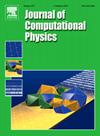用反应数具有对数复杂度的随机算法模拟聚类动力学
IF 3.8
2区 物理与天体物理
Q2 COMPUTER SCIENCE, INTERDISCIPLINARY APPLICATIONS
引用次数: 0
摘要
我们展示了如何适应和修改随机模拟算法(有时也被称为Gillespie算法或速率方程的动力学蒙特卡罗算法)来有效地模拟大型系统的簇动力学方程,通过将每个移动物种的内部时间尺度和优先级队列与二进制堆相关联,绕过SSA的线性复杂性。二进制堆的内部时间重新规范化了物理时间,从而使其与有关移动物种的簇的数量无关,而二进制堆允许有效的排序进展。所得算法的算法复杂度与可移动簇类型的数量呈线性关系,但与不可移动簇物种的数量呈对数关系,因此在可移动簇数量较少时非常有效,这是大多数簇动力学模型所满足的情况。作为一种物理应用,我们通过使用随机算法积分相关的簇动力学方程来模拟辐照下0.1% feecu1系统中缺陷簇的时间演化。与直接方法相比,该算法的加速是实质性的,大约几个数量级,同时消耗的内存比确定性模拟少得多。本文章由计算机程序翻译,如有差异,请以英文原文为准。
Cluster dynamics simulations using stochastic algorithms with logarithmic complexity in number of reactions
We show how to adapt and modify the Stochastic Simulation Algorithm (also sometimes referred to as the Gillespie algorithm or the kinetic Monte Carlo algorithm for rate equations) to efficiently simulate cluster dynamics equations for large systems, bypassing the linear complexity of the SSA by associating an internal time scale and priority queues with binary heaps for each mobile species. The internal time of a binary heap renormalises the physical time thus making it independent of the number of clusters of the mobile species concerned, while the binary heaps allow efficient sorting advances. The resulting algorithm has an algorithmic complexity that is linear with respect to the number of mobile cluster types, but logarithmic with respect to the number of immobile cluster species, thus being extremely effective when the number of mobile species is small, a situation satisfied in most models of cluster dynamics. As a physical application, we simulate the time evolution of defect clusters in a FeCu system under irradiation, by integrating the associated cluster dynamics equations using the stochastic algorithm. The speed-up of the algorithm, compared to the direct method is substantial, about several orders of magnitude, while consuming much less memory than deterministic simulations.
求助全文
通过发布文献求助,成功后即可免费获取论文全文。
去求助
来源期刊

Journal of Computational Physics
物理-计算机:跨学科应用
CiteScore
7.60
自引率
14.60%
发文量
763
审稿时长
5.8 months
期刊介绍:
Journal of Computational Physics thoroughly treats the computational aspects of physical problems, presenting techniques for the numerical solution of mathematical equations arising in all areas of physics. The journal seeks to emphasize methods that cross disciplinary boundaries.
The Journal of Computational Physics also publishes short notes of 4 pages or less (including figures, tables, and references but excluding title pages). Letters to the Editor commenting on articles already published in this Journal will also be considered. Neither notes nor letters should have an abstract.
 求助内容:
求助内容: 应助结果提醒方式:
应助结果提醒方式:


